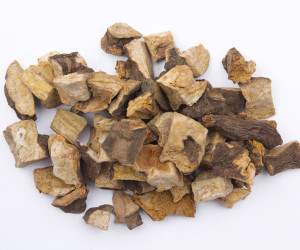Grown mostly in China, polygoni, or fleeceflower root, is a chocolate-colored root in the Polygonaceae family along with buckwheat and rhubarb. It is currently being researched for the treatment of diabetes as well as heart disease. When cooked, its liquid looks and smells like coffee, and it is sometimes used as a substitute for coffee.
Contents
Uses
In the term of TCM, Radix polygoni multiflori:
1: Tonifies the Liver and Kidneys, Nourishes Blood, and Augments Jing.
2: Secures Jing, Stops Leakage.
3: Relieves Fire Toxicity.
4: Moistens Intestines, Unblocks Bowels.
5: Expels Wind from Skin by Nourishing Blood.
6: Treats Malarial Disorder.
Benefits
- Polygoni is used for hair loss, both topically and as a tea. It is also used to lower serum cholesterol, and for treatments against diabetes and heart disease. It moistens the intestines, helpful for constipation and replenishes lost moisture within the bowels to move hard stool.
Caution
- Liver and kidney problems, high cholesterol, insomnia, lower back and knee soreness, premature graying, dizziness, and other conditions.
Interactions
None are recorded.
Other names
He Shou Wu , 何首乌, 首乌, Shou Wu,Tuber Fleeceflower Root, 何首烏, 首烏
Reference
Source: AskDrMao, http://www.askdrmao.com/natural-health-dictionary/polygoni/
ActiveHerb, https://www.activeherb.com/extract/heshouwu.shtml
Oldtcm, http://old.tcmwiki.com/wiki/radix-polygoni-multiflori

